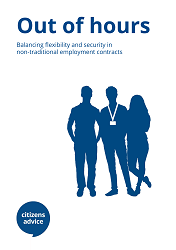Out of hours: Balancing flexibility and security in non-traditional employment contracts
 The world of work is changing. Over the past few years Citizens Advice has seen an increase in clients with problems related to non-traditional work patterns, and the number facing difficulties accessing entitlements such as sickness and holiday pay.
The world of work is changing. Over the past few years Citizens Advice has seen an increase in clients with problems related to non-traditional work patterns, and the number facing difficulties accessing entitlements such as sickness and holiday pay.
Earlier this year we started a programme of research looking at the challenges faced by people on low incomes with non-traditional contracts. In
The world of work is changing. Over the past few years Citizens Advice has seen an increase in clients with problems related to non-traditional work patterns, and the number facing difficulties accessing entitlements such as sickness and holiday pay.
Earlier this year we started a programme of research looking at the challenges faced by people on low incomes with non-traditional contracts.
In Out of hours: Balancing flexibility and security in non-traditional employment contracts [ 2.3 mb] we publish the findings of one aspect of that research: a set of 47 in depth interviews with people with a range of different non-traditional contracts, including seasonal work, shift work, fixed-hour plus contracts, zero hours contracts and multiple jobs.
The situations of the participants in this research were complex, and indeed many enjoyed and appreciated their jobs, even if they sometimes faced challenges at work or at home as a result of their work conditions. Across the participants, the three most striking things we found were:
People rarely choose flexibility
Participants in this research generally hadn’t chosen flexibility, but had it forced upon them for a variety of reasons. They usually wanted traditional full-time or part-time jobs with set hours every week.
However, they tended to lack the opportunity to move into jobs with more traditional contracts, hemmed in by a range of external and personal circumstances, including poor local labour market conditions, low skills or qualifications, the dominance of non-traditional contracts in their chosen sector, their own caring duties, or expensive and impractical childcare.
Non-traditional contracts cause insecurity
Even if they enjoyed their job and were happy with their hours, participants often encountered problems in their wider lived as a result of their flexible contracts and fluctuating earnings. Constantly shifting work could made it difficult to:
-
Manage day to day finances;
-
Plan for the future;
-
Claim benefits;
-
Have good relationships with family and friends; and
-
Stay in good physical and mental health.
Difficulties managing day to day finances and planning for the future were particularly acute for those who had no other form of income in their household. Overall, our participants felt a strong sense of insecurity, despite being in work and trying to do the right thing.
Agency and control at work can be undermined by non-traditional contracts
Participants also faced problems at work. They reported that a sense of agency and control over their working lives increased their wellbeing and commitment to their jobs. This research found four main areas where people on non-traditional contracts are at risk of losing that sense of agency. These are:
-
The design of employment contracts;
-
Shift and rota management;
-
Knowledge of entitlements at work; and
-
Confidence in using those entitlements.
The research also highlights many examples of the responsible use of flexible contracts by employers.

